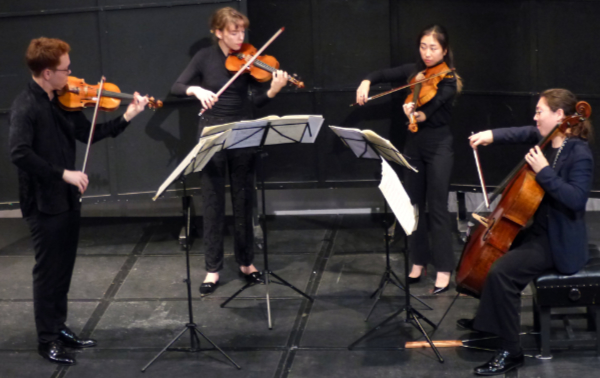| Schubert | String Quartet No. 9 in G minor, D173 |
| Janáček | String Quartet No. 1 'The Kreutzer Sonata' |
| Brahms | String Quartet No. 1 in C minor, Op. 51 No. 1 |

The
Leonkoro Quartet from Berlin won First Prize in the Wigmore Hall’s competition
last year, and we had the honour to be one of the venues included in their
prize-winner’s tour. Well done to Artistic Director Chris Darwin to snap them
up and start the Nicholas Yonge season so brilliantly. Brothers Jonathan and
Lukas Schwarz had the outer positions on the platform, with second violin
Amelie Wallner and violist Mayu Konoe in between, all except the cellist
playing standing up. They played from printed parts rather than electronic
gadgets.
A
near capacity audience was treated to three wildly different works. Schubert’s
Quartet 9 in G minor is a rarity despite being Schubert, as it’s a work of his
teens and his later more famous works are those nearly always programmed. The
youthful Leonkoro Quartet, though considerably older than the composer when he wrote
the piece, could and did supply all the ‘brio’ that he wanted for the first
movement, and they played the final two movements con brio too, perfectly
appropriate. To the second movement by contrast they brought great tenderness
and lightness of touch.
Both
of Janáček’s only two quartets have stories attached, as Chris’s programme note
explains, but one can ignore the baggage and concentrate on the extraordinary
music. The first three movements, as played, successfully led up to the fourth,
but one doesn’t have to have Tolstoy’s narrative in mind. ‘Con moto’ is
demanded in all four movements and the players certainly supplied it, making as
sharp contrasts with the slower sections as the composer surely wanted.
Contrasts was my dominant impression of their approach as a whole. The sul
ponticello passages could not have been more scratchy, the dramatic passages
more dramatic.
Janáček’s
quartet could be followed only by the interval, and the interval only by
Brahms. Opus 51, no. 1, to me about the most lyrical quartet in the repertoire,
is almost popular: when I asked an Amazon Echo speaker to play it the device
launched immediately into the second movement, describing it as jointly by
Johannes Brahms and the Amadeus Quartet. The Leonkoro Quartet could hardly, and
wouldn’t wish to, match the smoothness of the Amadeus Quartet, but their
respect for Brahms’s rhythmic complexities was greater. As is essential for this
work in particular, all four players could make their instruments sing. The two
middle voices have many passages where one or other of them leads, and we heard
lovely tone from the viola in its middle register, as well as, from the second
violin, the magical passage in the third movement where the player alternates
the same note on open and stopped adjacent strings. Nothing was improvisatory
here. Although Brahms revised and revised and tried out version after version,
every note from the Leonkoro Quartet seemed to lead inexorably to the next.
The
group gave us a (prefigured) encore, a Fantasia by Henry Purcell, originally
for viols, but perfectly good for a modern string quartet, or for this modern
string quartet in particular. The Leonkoros were keen to sell us their one CD,
and we are an elderly enough audience for that to be a good bet. What a shame
though that the young now hardly listen to CDs, I am told, not even owning a CD
player, and thus own no recordings but rely instead on more licences to listen,
hardly to be counted on beyond the short term.
Reviewer: Charles Goldie
Photographer: David James